Family counseling orlando is a therapeutic approach that focuses on improving communication, resolving conflicts, Benefits of family counseling and strengthening relationships within a family unit. It provides a safe and supportive space for family members to address challenges, enhance understanding, and work towards building healthier dynamics.
Family counseling orlando, also known as family therapy, is a specialized form of therapy that involves multiple family members participating in the counseling process.
It recognizes that individual issues are often interconnected with family dynamics and aims to address these dynamics to promote positive change. Family counseling helps families navigate various challenges such as communication breakdowns, parenting difficulties, conflicts, and transitions.
Enhancing Communication: Discover how family counseling can improve communication patterns within the family, fostering better understanding and empathy among family members.
Conflict Resolution Strategies: Learn about effective strategies and techniques used in family counseling to resolve conflicts and promote healthier problem-solving within the family.
Strengthening Family Bonds: Explore how family counseling can strengthen the bonds between family members, fostering a sense of unity, support, and mutual respect.
Addressing Family Transitions: Understand how family counseling can help families navigate transitions such as divorce, blending families, or adjusting to life-changing events.
Family counseling provides a collaborative and inclusive environment where family members can come together to address their concerns, improve communication, and develop healthier ways of relating to one another.
The counselor facilitates open dialogue, promotes active listening, and assists the family in identifying and resolving conflicts or challenges.
Through this process, families can build stronger relationships, enhance problem-solving skills, and create a more harmonious and supportive family environment.
4 Benefits of Family Counseling Orlando
| ✅ Benefit | ✅ Description |
| ✔ Improved Communication | ✔ Enhances family members’ ability to effectively communicate, express needs, and listen to one another. |
| ✔ Conflict Resolution | ✔ Equips families with strategies to resolve conflicts in a constructive and respectful manner. |
| ✔ Strengthened Relationships | ✔ Promotes a sense of closeness, trust, and mutual understanding among family members. |
| ✔ Emotional Support | ✔ Provides a supportive space for family members to share and process emotions together. |
Key Takeaway: Family Counseling Orlando
Improved Communication: Family counseling helps families develop effective communication skills, promoting understanding and connection.
Conflict Resolution: Families learn constructive strategies to resolve conflicts and build healthier relationships.
Strengthened Relationships: Through the counseling process, family bonds are strengthened, fostering a sense of unity and support.
Emotional Support: Family counseling provides a safe space for family members to express and process emotions, promoting emotional well-being.
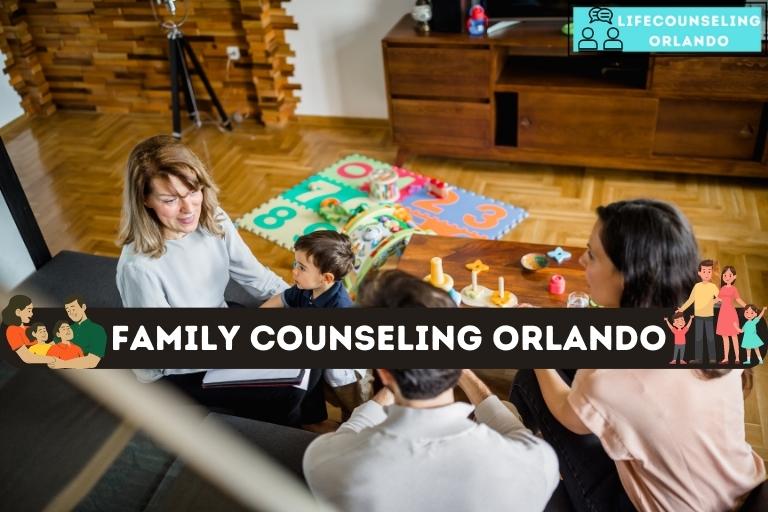
Five Facts About: Family Counseling Orlando
📌 Fact 1: Family counseling involves the participation of multiple family members, recognizing the influence of family dynamics on individual well-being.
📌Fact 2: Family counseling can address a wide range of concerns, including parent-child conflicts, sibling rivalries, blended family challenges, and communication breakdowns.
📌 Fact 3: Research has shown that family counseling can lead to improved family functioning, reduced conflict, and increased overall family satisfaction.
📌 Fact 4: Family counseling is effective across different stages of the family life cycle, from early childhood through adolescence and adulthood.
📌 Fact 5: Family counseling sessions typically last around 60 minutes, with the frequency of sessions determined based on the family’s needs and goals.
Family Counseling Orlando is a passion here at High Expectations. We love working with the whole system. Family counseling moves fast. Strategic and structural methods of counseling where we are highly involved as a member or “player” in the family. We are not passive therapist that will sit back and listen for an hour only to throw out a few suggestions.
We are constantly looking for patterns and areas of communication broken down and not working. Once we find the loops and negative systems, we jump right in and start the work.
Family counseling orlando and therapy is very unique. Most often times very small shifts and changes in behavior result quickly in positive results. Don’t worry if only one member is seeking counseling for the entire family.
Change can happen even with just one! It is a gift to give your family the opportunity to grow and provide a safe and nurturing environment.
Family therapy is effective. This is due to the dynamics of the family members and the ability to work with more than just one member. The more members involved the faster the change.
During a major change in the family system such as a divorce or a remarriage, the children are greatly affected. To the degree at which the adults can stay in a space that is kind and loving without the need to paint someone as the victor and the other the destroyer, the kids can and will make a smooth transition.
It all depends on if you can keep your fighter out of the situation. If you can try to stay in your adult self then your kids can see you walk through this process with dignity and respect.
- Improvement in family communication.
- Increased awareness of roles and how to reach each other in times of distress.
- A more cohesive system working together for the same common goals.
- Flexibility in communication and increased sense of autonomy and healthy dependence.
- A greater connection to others and self.
- Regaining your self-confidence as a parent and as the child or teen.
- Reduction in relationships.
- An increase in intimacy with your loved ones.
- Increase in assertiveness and ability to speak your mind in a healthy way.
- Regaining emotional stability.
- Improved quality of life.
- Each member able to reach their full potential.
- An overall lightness settles in and each member hooks their attention off of each other and let’s them be who they are.
- Step parent and blended family issues
- Financial hardships
- Effective discipline and parenting styles
- Coping with a move, loss of a close member of the family, pet.
- Anger related issues.
- Power and control issues
- Mutual Respect and lack of it
- Ongoing domestic violence, (verbal, physical, emotional)
- Coping with a divorce or separation.
- Problem with academics or peer relationships.
Effective Parenting
Explore what works when it comes to all family members being heard, understood and communicating in a healthy way.
Single Parenting
You are not alone. Learn to process the difficulties. Understand how to make life more manageable for you and your children.
Blended Families
Learn to make a smooth transition for all members during the time when two families are coming together.
The Importance of Family Communication
Learn the how to effectively communicate as a healthy system. Respect, listening and validating each other as a whole and as unique individuals.
Helicopter Parenting
Do you allow your children the room they need to become independent thinkers? Are you able to let them face their own consequences and challenges natural in the process of development?
Toxic Families
How to tell if your family is showing signs of being toxic and what you can do.
Benefits of Family Counseling
What are they and can counseling help my family?
Broken Communication Thanks to Texting
Texting is now the new way family members communicate. It is doing harm for families. Understand how to get back to the basic and talk.
The Ideal Family and What It May Look Like
Take a look inside what a healthy family looks like. Hence there is no perfect family.
Family Conflict and How to Deal With It
What do you do when your family is in constant turmoil? Understanding how to respond to your own needs and those of the other family members is vital for strengthening the family bond.
- 4 Benefits of Family Counseling Orlando
- Key Takeaway: Family Counseling Orlando
- Five Facts About: Family Counseling Orlando
- Understanding Family Dynamics
- The Role of a Family Counselor
- Case Study: How a Family Counselor Helped a Troubled Family
- Types of Family Counseling
- Finding the Right Family Counseling
- The Process of Family Counseling Orlando
- The Impact of Family Counseling Orlando
- FAQ
- Conclusion
Understanding Family Dynamics
Definition of Family Dynamics
Family dynamics refers to the patterns, interactions, and relationships within a family unit.
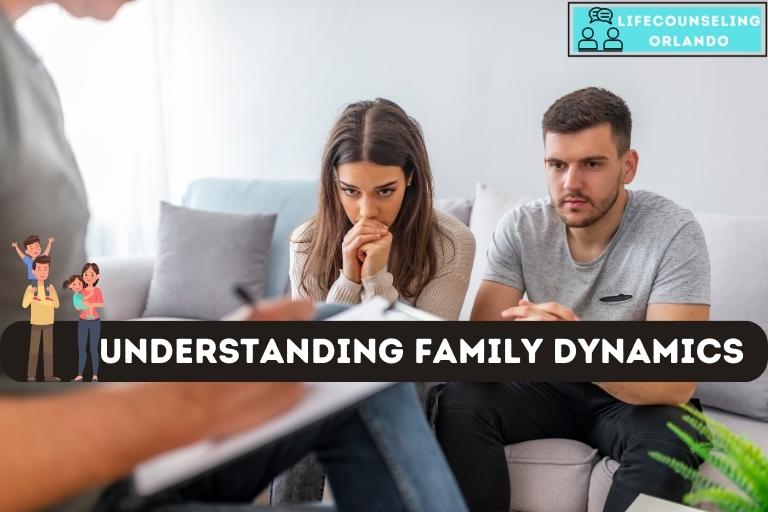
It encompasses the way family members communicate, solve problems, and express emotions.
Understanding family dynamics is essential as it helps identify the root causes of conflicts and provides insights into the functioning of the family as a whole.
Common Challenges in Family Dynamics
Family dynamics can be influenced by a range of factors, leading to various challenges.
Some common issues include:
- Communication breakdown: Difficulties in expressing thoughts, emotions, and needs can lead to misunderstandings and conflicts within the family.
- Power struggles: Imbalances in decision-making and authority can cause friction and tension among family members.
- Role conflicts: Conflicting expectations and responsibilities can create stress and strain relationships within the family.
- Financial stress: Money-related issues can lead to anxiety, resentment, and conflicts within the family.
- Life transitions: Major life events such as marriage, divorce, birth, or death can disrupt family dynamics and require adjustment.
Benefits of Addressing Family Dynamics of Family Counseling Orlando
Addressing family dynamics through counseling can yield numerous benefits, including:
- Improved communication: Counseling provides strategies for effective communication, helping family members express themselves and understand each other better.
- Enhanced problem-solving skills: Family counseling equips families with problem-solving techniques to resolve conflicts and make decisions collaboratively.
- Strengthened relationships: By addressing underlying issues, family counseling promotes understanding, empathy, and trust among family members.
- Increased resilience: Families learn coping mechanisms and resilience-building strategies to navigate through difficult situations and challenges.
- Positive impact on children: Family counseling can significantly benefit children by creating a stable and supportive family environment, promoting their well-being and development.
Real-life examples of Family Dynamics
To illustrate the importance of family dynamics, consider the following examples:
Example 1:
In a family struggling with constant arguments and misunderstandings, family counseling helped the parents and children learn effective communication techniques.
As a result, conflicts reduced, and the family started fostering a more harmonious environment.
Example 2:
A blended family faced challenges in blending different parenting styles and resolving conflicts between step-siblings.
Through counseling, the family members gained a better understanding of each other’s perspectives and worked towards building a cohesive and nurturing family unit.
The Role of a Family Counselor
Responsibilities of a Family Counselor
A family counselor is a trained professional who helps families address their challenges, improve relationships, and develop healthier dynamics.
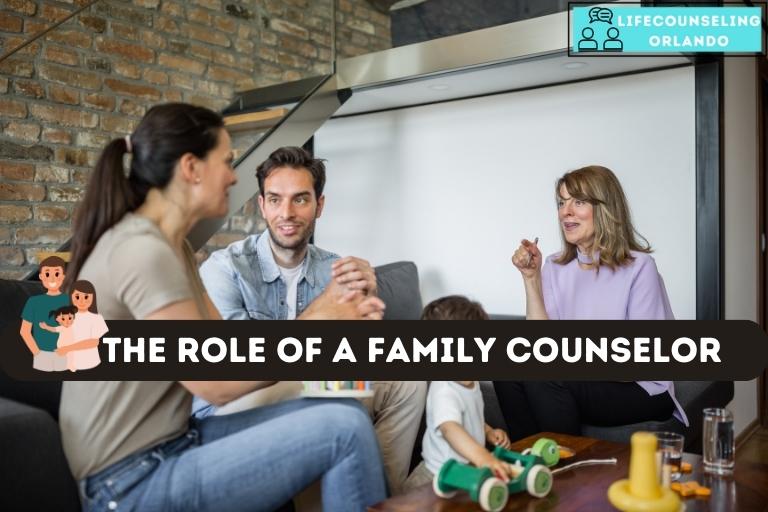
Some key responsibilities of a family counselor include for Family Counseling Orlando:
- Assessing family dynamics and identifying areas of concern.
- Facilitating open and constructive communication among family members.
- Developing personalized treatment plans based on the family’s unique needs.
- Providing guidance and support to improve problem-solving and decision-making skills.
- Utilizing evidence-based techniques and interventions to promote positive change.
Skills and Qualifications of a Family Counselor
To effectively assist families, a family counselor requires a diverse skill set and specific qualifications.
Some essential skills for a family counselor include:
- Empathy: The ability to understand and connect with individuals’ emotions and experiences is crucial for establishing trust and rapport with family members.
- Active Listening: By actively listening, the counselor can gain insights into the family’s dynamics, concerns, and needs.
- Conflict Resolution: A family counselor should be skilled in helping families resolve conflicts and find common ground through mediation and negotiation techniques.
- Cultural Competence: Understanding and respecting diverse cultural backgrounds is vital to ensure inclusivity and promote effective counseling for families from different backgrounds.
- Ethics and Confidentiality: Upholding ethical standards and maintaining strict confidentiality are essential to create a safe and trustful environment for families.
Techniques Used in Family Counseling
Family counselors employ various techniques and interventions to address family dynamics and promote positive change.
Some commonly used techniques include:
- Family Systems Therapy: This approach focuses on examining the interactions and patterns within the family system to identify areas of dysfunction and develop strategies for improvement.
- Cognitive-Behavioral Therapy (CBT): CBT helps individuals identify negative thought patterns and behaviors that contribute to family conflicts. By replacing them with healthier alternatives, CBT promotes positive changes within the family
- Narrative Therapy: This technique involves exploring family members’ narratives and helping them reconstruct more positive and empowering stories about their lives and relationships.
- Solution-Focused Brief Therapy (SFBT): SFBT emphasizes identifying solutions and setting achievable goals rather than dwelling on problems. It encourages families to focus on their strengths and develop practical strategies to address challenges.
Case Study: How a Family Counselor Helped a Troubled Family
In a particularly challenging case, a family counselor in Orlando successfully assisted a family struggling with deep-rooted conflicts and strained relationships.
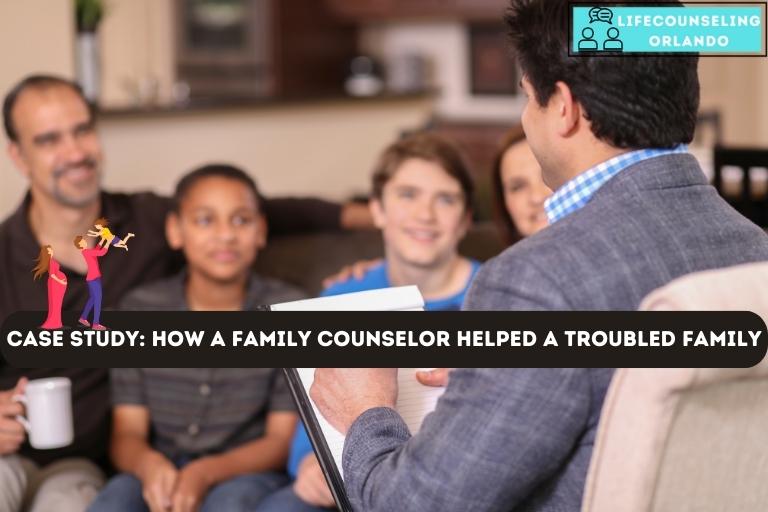
The counselor employed a combination of family systems therapy and cognitive-behavioral therapy to address the underlying issues and facilitate positive change.
Through regular counseling sessions, the family members gradually improved their communication, resolved conflicts, and rebuilt their relationships.
The case serves as a testament to the transformative impact family counseling can have on families facing significant challenges.
Case Study 1: Restoring Communication and Trust
Background:
The Johnson family consisted of parents, Mark and Sarah, and their two teenage children, Emily and Jason.
The family was facing severe communication breakdowns and conflicts, resulting in constant arguments and strained relationships.
Approach:
- The family sought the help of a family counselor to address their issues.
- The counselor began by establishing a safe and non-judgmental environment, allowing each family member to express their feelings and concerns.
- The counselor employed active listening and empathy to understand each individual’s perspective.
- The counselor encouraged open and respectful communication among family members.
- They facilitated family meetings where each person had the opportunity to speak without interruption.
- Through various therapeutic techniques, the counselor helped the family develop effective communication skills, such as active listening and expressing emotions constructively.
- The counselor also worked on rebuilding trust within the family.
- They identified underlying issues and encouraged family members to take responsibility for their actions.
- The counselor facilitated forgiveness exercises and guided the family in setting realistic expectations for each other.
Outcome:
Over several sessions, the Johnson family experienced significant improvements.
Communication barriers were gradually broken down, and conflicts reduced in frequency and intensity.
Family members started listening and empathizing with each other, fostering a more harmonious and supportive atmosphere. Trust was rebuilt, allowing the family to work together towards common goals and strengthening their relationships.
Case Study 2: Coping with Divorce and Co-Parenting Challenges
Background:
The Davis family went through a painful divorce, leaving a lasting impact on the emotional well-being of the parents.
John and Lisa, as well as their two young children, Emma and Ethan.
Co-parenting became a significant challenge, leading to conflicts and stress for all family members.
Approach:
- Seeking assistance, the Davis family engaged a family counselor specializing in divorce and co-parenting issues.
- The counselor recognized the importance of addressing the emotional needs of each family member while focusing on effective co-parenting strategies.
- The counselor conducted individual sessions with each family member to explore their feelings and concerns regarding the divorce.
- They provided a supportive space for the children to express their emotions, reassuring them that their feelings were valid and helping them develop healthy coping mechanisms.
- In joint counseling sessions, the counselor facilitated constructive communication between John and Lisa.
- They encouraged the parents to prioritize the children’s well-being and establish a consistent co-parenting plan.
- The counselor guided the family in setting boundaries and managing conflict, emphasizing the importance of maintaining open lines of communication.
Outcome:
Through regular counseling sessions, the Davis family experienced positive changes.
The children’s emotional well-being improved as they gained a sense of stability and security. John and Lisa learned effective co-parenting strategies and developed a more cooperative relationship, focusing on the children’s needs.
The family counselor helped the Davis family establish a foundation for successful co-parenting, minimizing conflicts and creating a healthier environment for everyone involved.
Case Study 3: Addressing Substance Abuse and Rebuilding Family Bonds
Background:
The Thompson family faced a challenging situation when their eldest son, Michael, developed a substance abuse problem.
His addiction had strained relationships within the family, causing feelings of anger, guilt, and resentment.
Approach:
- The Thompson family engaged a family counselor specializing in addiction and recovery.
- The counselor began by providing education and support to the entire family regarding substance abuse and its effects.
- They helped family members understand addiction as a disease and addressed any misconceptions or stigmas associated with it.
- The counselor conducted individual sessions with Michael to address his addiction and develop a personalized recovery plan. They facilitated family sessions, where family members expressed their concerns and emotions in a safe environment.
- The counselor encouraged open dialogue, allowing each family member to share their experiences and perspectives.
- The counselor also focused on rebuilding trust and strengthening the family bonds.
- They guided the family in establishing healthy boundaries, supporting Michael’s recovery while ensuring self-care for each family member.
- The counselor encouraged the family to engage in activities that promoted bonding and understanding, fostering empathy and compassion within the family unit.
Outcome:
Through consistent counseling sessions, the Thompson family witnessed significant progress.
Michael embraced his recovery journey, supported by his family’s understanding and encouragement.
The family members developed a deeper understanding of addiction, reducing blame and fostering empathy.
Trust was rebuilt as the family actively worked on improving communication and expressing their emotions. The Thompson family learned to navigate the challenges of addiction together, promoting healing and a renewed sense of unity.
Types of Family Counseling
Family counseling encompasses various specialized areas that cater to the unique needs of different family structures and dynamics.
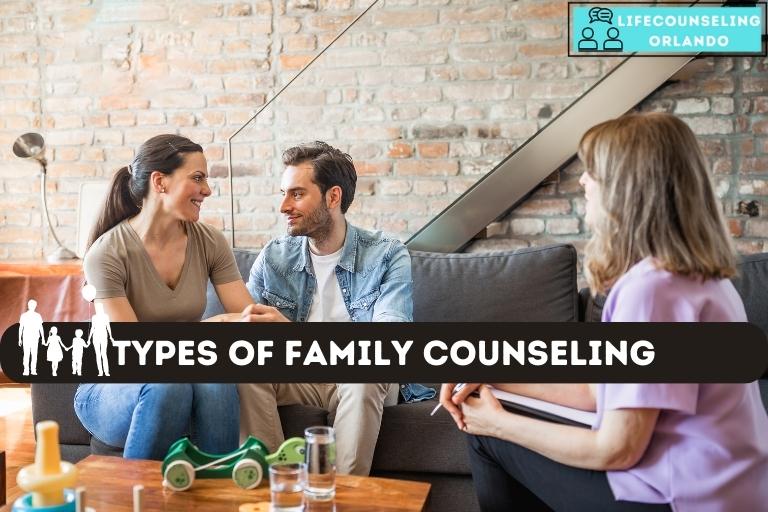
The following are some common types of family counseling:
Individual Counseling
Individual counseling focuses on addressing the specific concerns and challenges faced by an individual within the family. It provides an opportunity to explore personal issues, develop coping strategies, and gain insights into how one’s actions and emotions impact the family unit.
Couples Counseling
Couples counseling, also known as marriage counseling, aims to improve the relationship between romantic partners. It addresses issues such as communication problems, conflict resolution, intimacy, trust-building, and shared decision-making. Couples counseling can benefit married couples, engaged couples, or couples in long-term relationships.
Parenting Counseling
Parenting counseling assists parents in developing effective parenting skills and strategies. It addresses concerns related to child discipline, behavior management, setting boundaries, and promoting healthy parent-child relationships. Parenting counseling can benefit parents of children of all ages, from infants to adolescents.
Blended Family Counseling
Blended family counseling focuses on addressing the unique challenges faced by families formed through remarriage or cohabitation. It helps family members navigate the complexities of blending different parenting styles, managing step-sibling relationships, and establishing new family dynamics.
Each type of family counseling caters to specific needs and requires specialized expertise from the counselor.
By selecting the appropriate type of counseling, families can ensure they receive the most relevant and effective support.
Finding the Right Family Counseling
Finding the right family counselor is crucial for a successful counseling experience.
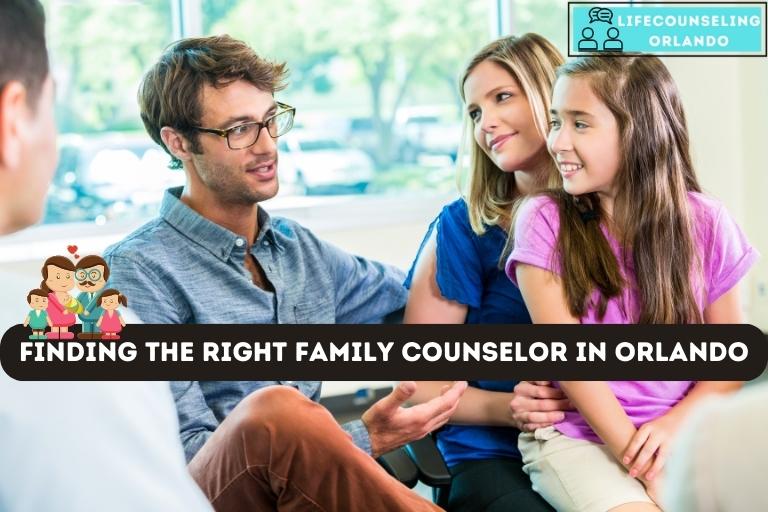
Consider the following steps when searching for a family counselor in Orlando:
Researching Counseling Services
Start by conducting thorough research on counseling services available in Orlando. Look for reputable counseling centers or private practices that specialize in family counseling. Online directories, professional associations, and recommendations from trusted sources can provide valuable information.
Asking for Referrals
Ask for referrals from friends, family members, or healthcare professionals who have had positive experiences with family counseling. Personal recommendations can help narrow down the options and provide insights into the counselor’s expertise and approach.
Considering Specializations and Expertise
When choosing a family counselor, consider their specializations and expertise. Some counselors may have additional training and experience in specific areas, such as couples counseling, parenting counseling, or trauma-informed care. Selecting a counselor who aligns with your specific concerns can enhance the effectiveness of the counseling process.
Initial Consultation and Assessment
Schedule an initial consultation with potential family counselors. This meeting allows you to gauge their approach, ask questions, and determine if there is a good fit between your family and the counselor. Discuss your concerns, goals, and expectations to ensure the counselor can provide the support you need.
The Process of Family Counseling Orlando
The process of family counseling involves several key steps that contribute to its effectiveness in addressing family dynamics and improving relationships.
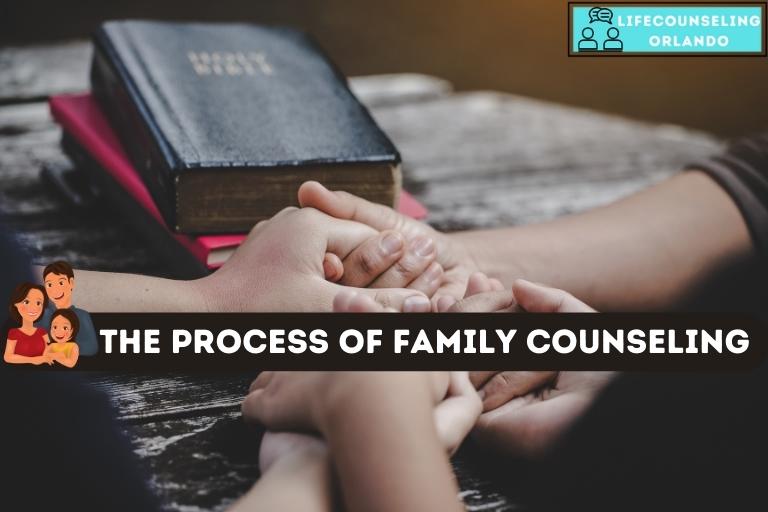
Setting Goals and Objectives
At the beginning of the counseling process, the family and the counselor collaborate to establish clear goals and objectives. These goals can be broad, such as improving communication, or specific, such as resolving a particular conflict. Clearly defining the desired outcomes helps guide the counseling sessions and measure progress.
Establishing Trust and Confidentiality
Trust and confidentiality are paramount in family counseling. Counselors create a safe and non-judgmental environment where family members feel comfortable sharing their thoughts, emotions, and concerns. Ensuring strict confidentiality builds trust and allows families to explore sensitive topics without fear of judgment or repercussions.
Communication and Conflict Resolution Techniques
Family counseling equips families with effective communication and conflict resolution techniques. Counselors help family members develop active listening skills, assertive communication, and empathy. They also teach conflict resolution strategies that promote understanding, compromise, and mutual respect.
Developing Coping Strategies
Counselors assist families in developing coping strategies to manage stress, navigate challenges, and promote emotional well-being. These strategies may include relaxation techniques, mindfulness exercises, problem-solving skills, and emotional regulation techniques. By equipping families with these tools, counselors empower them to face difficulties and maintain healthy dynamics outside of counseling sessions.
The Impact of Family Counseling Orlando
Family counseling can have a profound impact on the overall well-being and functioning of a family.
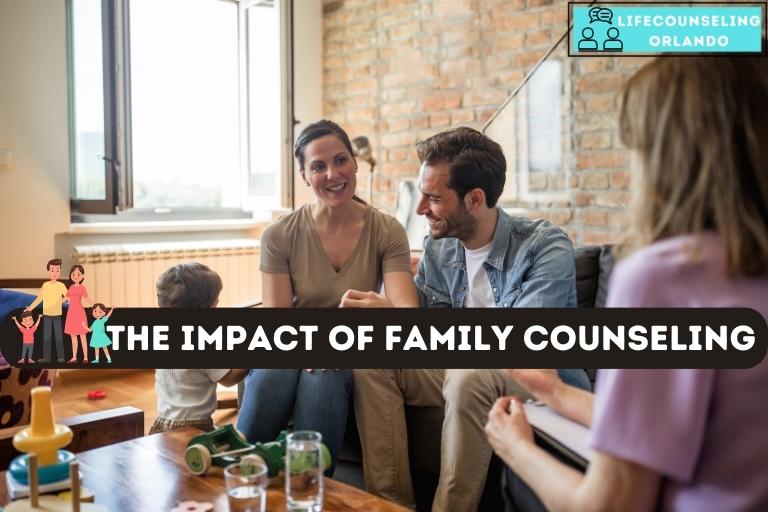
Some of the significant benefits include:
Improving Communication and Relationships
Through counseling, families learn effective communication techniques that foster understanding, empathy, and mutual respect.
Improved communication leads to healthier relationships and the ability to navigate conflicts constructively.
Strengthening Emotional Bonds (Family Counseling Orlando)
Family counseling provides a space for family members to express their emotions and develop deeper emotional connections.
It helps create a supportive and nurturing environment where individuals feel understood, validated, and loved.
Resolving Conflicts and Managing Stress
Counseling equips families with conflict resolution skills, allowing them to address conflicts in a productive manner.
Families learn to manage stress, reduce tension, and find mutually satisfying solutions.
Enhancing Family Well-being
By addressing underlying issues and promoting healthy dynamics, family counseling enhances the overall well-being of the family.
It contributes to increased happiness, improved mental health, and a stronger sense of unity and cohesion.
FAQ
Is family counseling suitable for all types of families?
Family counseling can benefit all types of families, including nuclear families, blended families, single-parent families, and extended families. The techniques and strategies employed in family counseling are adaptable to the unique dynamics of each family structure.
How long does family counseling usually last?
The duration of family counseling varies depending on the specific needs and goals of the family. Some families may require only a few sessions to address specific concerns, while others may benefit from longer-term counseling to address deep-rooted issues.
Can family counseling be effective if only one family member attends?
While it is ideal for all family members to participate in counseling, significant positive changes can still occur even if only one family member attends. By implementing the strategies and skills learned in counseling, the attending individual can positively impact the family dynamics.
Is family counseling covered by insurance?
Many insurance plans provide coverage for family counseling services. It is recommended to contact the insurance provider to inquire about coverage details, including the specific services and providers covered.
What if my family is hesitant about attending counseling?
It is common for families to feel hesitant or resistant to attending counseling. Openly discussing the benefits of counseling, sharing success stories, and addressing any concerns can help alleviate hesitation. Explaining that counseling is a proactive step towards improving relationships and well-being can also be helpful.
Conclusion
Family counseling in Orlando provides valuable support to families facing challenges in their dynamics and relationships.
By addressing family dynamics, improving communication, and resolving conflicts, families can strengthen their bonds and promote a healthier and more fulfilling family life.
With the assistance of a skilled and qualified family counselor, families can navigate through difficulties, enhance their well-being, and build resilient and harmonious relationships.
In a particularly challenging case, a family counselor in Orlando successfully assisted a family struggling with deep-rooted conflicts and strained relationships.
The counselor employed a combination of family systems therapy and cognitive-behavioral therapy to address the underlying issues and facilitate positive change.
Through regular counseling sessions, the family members gradually improved their communication, resolved conflicts, and rebuilt their relationships.
The case serves as a testament to the transformative impact family counseling can have on families facing significant challenges.
